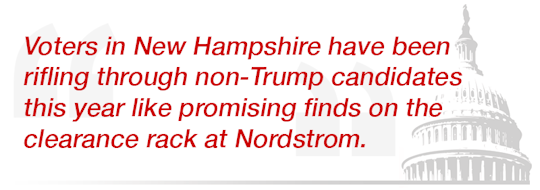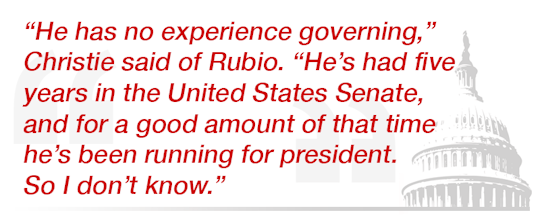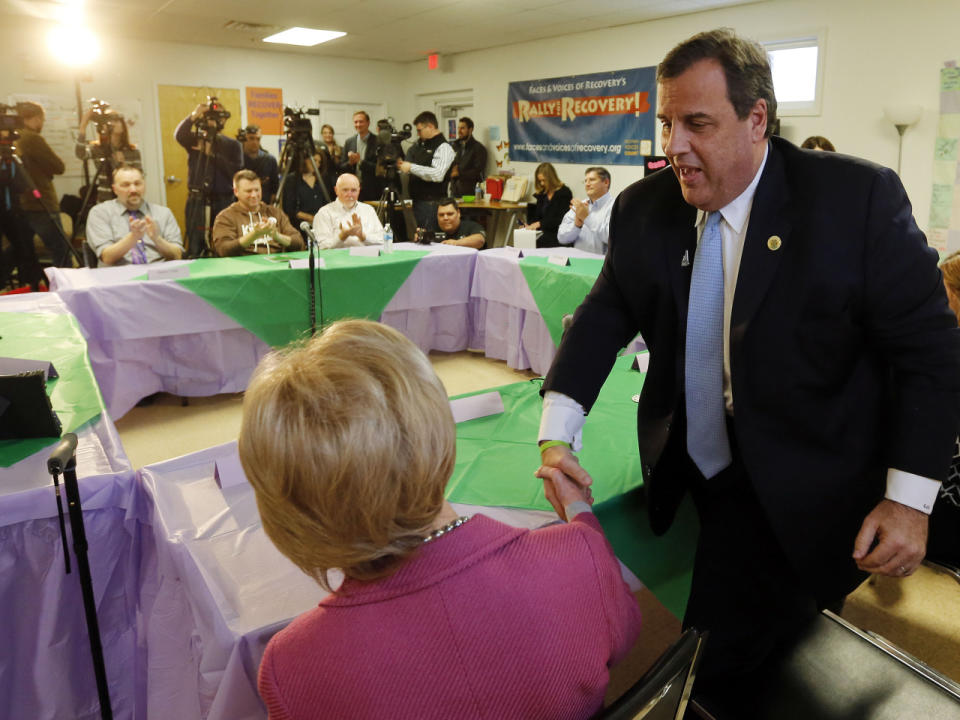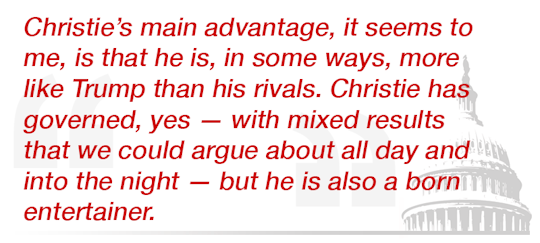Christie is getting his moment. The question is whether he can make it last.
Back in college, when he was contemplating a career in public office, Chris Christie got some advice from a political science professor that he never forgot.
“He told me, ‘If you’re gonna run for public office, you’d better become a good listener,’” Christie told me this week. “‘The only way people follow you is if you listen to them. And a leader without followers is just a guy out for a walk.’”
By that standard, you could say that Christie’s presidential campaign, for most of this year anyway, has been a long stroll in the park. Damaged by the infamous bridge scandal in New Jersey, his approval ratings at home cratering, Christie hasn’t come near double digits in the polling from New Hampshire, where he’s spent more time this year than any other candidate.
For a guy who was once the party’s biggest draw and whose potential candidacy loomed over the rest of the Republican field in 2012, the biggest humiliation came just last month, when he found himself excluded from the main debate stage in Milwaukee, outpolled by the likes of Rand Paul and Mike Huckabee.
I asked Christie, as he sat across from me Tuesday in a conference room at Manchester’s Saint Anselm College, if he’d been surprised by his lack of success throughout the summer and early fall.
“Frustrated, more than anything else,” he said, nodding. “But you can’t let that frustration dominate you. Then you become someone who’s unhappy in this process. And I never wanted to be someone who would do this as an unhappy person. You know, I enjoy doing this. And enjoying it makes me better at it. When I’m enjoying myself, I’m better.
“It’s hard,” Christie admitted. “But you know what? What I kept saying to myself is ‘I know I’m good at this. So I’ve just got to be patient with myself.’ And part of having the early success that I did is that it runs counter to that. So you have to grow up.”
Christie could afford to reflect a little, this being his best week as a candidate, hands down. He was a changed man from the reeling governor I wrote about for my first Political World column almost two years ago, when he gave me his first interview after the Fort Lee bridge scandal erupted, and more sure-footed than the guy who’d sat with me in his kitchen on the eve of his first trip to New Hampshire last April.

Christie’s campaign got a perverse boost, at least in terms of media attention, from the terrorist attacks in Paris, which breathed new urgency into the intelligence and national security issues he likes to talk about as a former prosecutor. (This week’s mass shooting in San Bernardino seems likely to intensify the focus on domestic security, even absent a definitive link to any terrorist cell.) Then came the surprising and much-coveted endorsement of the New Hampshire Union Leader last weekend.
Meanwhile, Christie’s marathon town hall meetings, a hallmark of his best days as New Jersey’s governor, are starting to take on the feel of John McCain’s legendary performances in 2000, when the Arizona senator surged from nowhere to win the state by 18 points. Clips of Christie’s emotive riffs about his mother’s death, or about his fear that his wife might have been killed in the twin towers, have been going viral for weeks.
Of course, none of this has yet translated into any sustained rise in support. (A PPP poll out today shows Christie leaping into double digits in New Hampshire, the first indication that the Union Leader endorsement may have some influence.) And even Christie seemed to be wondering if he was finally about to break out, or if he was just taking his turn under the lights like everyone else.
Voters in New Hampshire have been rifling through non-Trump candidates this year like promising finds on the clearance rack at Nordstrom. Jeb Bush, Scott Walker, Carly Fiorina, Ben Carson, John Kasich, and more recently Marco Rubio and Ted Cruz, have all had their moments in the dressing-room mirror, and all have been returned to the “maybe” pile (except Walker, who became the campaign’s first “discard”).
The state’s most influential Republicans remain divided, and despite all the jitters about Trump, there’s been no lasting, perceptible shift toward one rival candidate or another.
Something’s definitely happening for Christie in New Hampshire right now. The question, in this strange election season, is what, exactly, that something is, and whether we’ll still be talking about it in a couple of weeks.
*****
The best way to think about the Republican primary contest right now, if you haven’t entirely given up trying to make sense of it already, is as the inverse, roughly, of what we saw in 2012.
At about this time four years ago, you will recall, the clear establishment candidate was Mitt Romney. But the Republican electorate had never really warmed to Romney, and after the tea party takeover of Congress in 2010, all the energy was with the grassroots ideologues who were determined to derail him with a candidate of their own.
The problem for the anti-establishment Republicans is that they were anti-establishment, and as such, they spent an awful lot of time and energy fighting viciously over who that candidate should be. By January, as the Iowa caucuses approached, Romney was topping out at the mid-30s in most polls, which made him eminently beatable, but the rest of the Republican electorate was almost evenly divided among Newt Gingrich, Rick Santorum and Ron Paul.
In the end, Santorum played Romney to a draw in Iowa and got a huge boost, but it was Paul who came closest in New Hampshire, and then it was Gingrich who won outright in South Carolina. The insurgent candidates split their delegates, and Romney rolled to the nomination.
Turn that scenario inside out, and you could be looking at 2016. Now it’s Trump, the celebrity heir to the tea party insurgency, who’s consistently polling in the mid- to high 20s nationally — impressive for a populist outsider, far less so for a party frontrunner. Carson and Cruz, vying for support of the same disaffected factions, lag behind.

None of which would pose an insurmountable challenge for the governing wing of the party, at the end of the day, if it had an obvious standard-bearer. The problem is that in a field that has now narrowed to a mere 14 entrants, there are at least four — Rubio, Bush, Christie and Kasich — who can be considered serious establishment candidates.
In New Hampshire, where the governing wing will almost certainly have to make its stand, those four candidates have been bunched together (with Rubio slightly out in front), dividing among themselves all the local support and media attention a candidate needs to really separate himself.
Some analysts look at this situation and conclude that Trump is almost certain to be the nominee, in the same way that Romney easily vanquished his divided rivals. But here’s what I think they’re missing: Generally speaking, establishments don’t behave the way tea parties do.
Eventually, the party loyalists who make up an establishment tend to come together and coalesce around a likely winner. That’s why we call them establishments.
So the race in New Hampshire right now is all about who can persuade the state’s mainstream electorate that he’s the guy who can unify the party and stop Trump. That’s why Rubio is trotting out the endorsements of his fellow senators. That’s why Kasich is attacking Trump and casting himself as the one candidate who has the brass to take on the bully.
And that’s why the Union Leader endorsement would seem to matter this year, even if newspaper endorsements generally are about as useful as the classifieds. Here’s the most influential conservative institution in the state giving its stamp of approval to Christie, at a moment when a lot of Republican voters are anxious for someone to emerge from the pack.

Chris Christie at a meeting this week in Manchester, N.H. (Photo: Jim Cole/AP)
Christie’s moment is a long time coming, and it says something about his political skill and sheer persistence. When he entered the race formally back in June, a lot of my colleagues in the media — and a lot of his colleagues in the party — had already written him off. All anyone remembered about Christie, at that point, was the bridge thing.
In the parlance of politics, his “favorables” were underwater, meaning that more people had a bad impression of Christie personally than a good one. Being well liked is kind of important in politics, unless your last name is Trump or Clinton.
Undeterred, Christie set out to do what he does best, which is to reach voters on an emotional level. He’s hosted 36 town halls in New Hampshire since June, and while that hasn’t done much to lift the poll numbers most people look at, those numbers tell only part of the story.
By the middle of last month, according to a poll conducted by WBUR, Boston’s NPR station, Christie’s favorable rating in New Hampshire was up to 47 percent (from 39 percent in mid-September), while the number of people who retained an unfavorable impression of him had dropped from 39 percent to 33 percent. By contrast, during that same time, Bush and Kasich had seen their favorable numbers drop to the point where they were both underwater.
More remarkably, the latest PPP poll from New Hampshire now shows Christie with the highest favorability rating of any candidate. More than 60 percent of the state’s voters have a favorable impression of him, compared with 22 percent who don’t.
What this means to Christie is that, in New Hampshire at least, the bridge scandal no longer defines him.
“Listen, it will always be a part of my résumé,” he told me this week. “It will always be a part of my experience. I’m not happy about that, but it’s the fact. It happened on my watch. I’ve got to be accountable for it. On the other hand, it’s certainly nothing that’s front of mind anymore, and for a long time it was front of mind, for me and for others.”
What’s front of mind for Christie now, in the wake of the Paris attacks and perhaps San Bernardino too, is terrorism. At a town hall at a firehouse outside Concord Monday night, where by my rough estimate he drew more than 250 people, Christie spoke for 45 minutes before saying a single word about domestic policy.
What I realized, watching that performance, is that, in a strange way, the Paris attacks have unleashed Christie to do what comes most naturally to him, which is to tell a compelling story.

It’s not that he has any great plan for how to combat ISIS or safeguard American cities. What Christie does have is a personal story about his own family’s experience with terrorism and victims in his New Jersey neighborhood, about his years as a U.S. attorney and about a country that has, in his view, become complacent and irresolute.
“It’s the greatest strength I bring to the job, the history and the ability to make decisions in this realm without getting the high, hard one thrown by me,” Christie told me. “And I think a lot of presidents run the risk of that. And I just don’t think that I would on this, because I’ve been through so much of it before and heard and dealt with the lingo and the egos and all the rest.”
But he also agreed that the issue of terrorism is a prism through which voters can get to know him.
“I think that foreign policy is all about, at first blush, the personality of the people executing that foreign policy,” he said. “Kissinger said to me one time, ‘Foreign policy is all about courage and character. Everything else can be learned.’”
Part of the challenge for Christie here — and for other governing candidates in the race — is that voters this year just don’t seem to care very much about records or experience, or at least not yet. I mentioned to him a trend this year that has confounded me and many others: Governors, who generally made for the best candidates over the past half century or so, seem to be flailing this time around.
Nine current or former governors have been in the race on the Republican side. Of those, three — Walker, Rick Perry and Bobby Jindal — were the first to leave the Republican race. Not a single governor is polling in double digits.
Christie shook his head at me.
“The governors who have dropped out earned it,” he said, a little coldly. “They earned dropping out. Your performance matters. This stuff doesn’t happen by coincidence or by chance. The people still standing are the people who are the best at this.”
In fact, Christie has been making an overt case for executive experience, while throwing a few not-so-subtle punches at his opponents — notably Rubio. He tells audiences that “new is cool, new is shiny,” but in serious times you need a serious leader. He tells them that the last thing they need is a new president who sits down in the Oval Office on his first day and says, “Gee whiz.”
I wondered if that was entirely fair to Rubio, who is, after all, in federal office, and whom I’d consider part of the governing faction.
“Except he has no experience governing,” Christie shot back. “He’s had five years in the United States Senate, and for a good amount of that time he’s been running for president. So I don’t know.”
Was he saying that Rubio reminded him of a certain Democratic president?
“Yeah,” Christie said, expressionless. “Yes.”
Christie was more circumspect when it came to Trump, with whom he is trying to avoid the kind of full-on entanglement that hasn’t worked especially well for his rivals.

A few days earlier, after Christie had categorically rejected Trump’s story about New Jersey Muslims celebrating on Sept. 11, Trump fired off some nasty tweets about him. In one, I reminded Christie, Trump had wondered: “How is Chris Christie running the state of New Jersey, which is deeply troubled, when he is spending all of his time in NH?”
Christie seemed to twitch just a bit, but his voice remained calm.
“Since he’s never been a governor,” Christie said, “I’d think he’d have no idea.”
*****
Christie is the kind of politician, more like a Bill Clinton than a Barack Obama, who loves the brinkmanship of politics and thinks deeply about the strategy. So, near the end of our conversation, I asked him to talk a bit about how he saw the race playing out from here, and, a little to my surprise, he obliged.
The way Christie sees it, there will be room for only four to six candidates to emerge intact from the voting in Iowa and New Hampshire. That means maybe two of the governors in the race will be able to move on from there.
At that point, “there will be a lot of congealing,” Christie said, borrowing a word I had used. He reminded me that only three of the 31 Republican governors had endorsed anyone to this point (two for Christie, one for Kasich), and suggested that they might play a pivotal role, after the early contests, in swinging the party behind an eventual nominee.
“The governors’ wing of the party has not yet asserted itself in any significant way,” he told me. “If they do, how will that affect the race?”
In New Hampshire, where his campaign is clearly on the line, Christie has a simple strategy: hang around. He says the data from past campaigns shows that as many as seven in 10 voters won’t make up their minds until the last two weeks.
For now, he just wants to be in the “top three” for most voters, which is a phrase New Hampshirites — born to their privilege as presidential winnowers — use a lot.
Don’t the low poll numbers discourage him?
“I don’t fret too much about that,” Christie said. “In the beginning I did. I would say, why aren’t we getting any traction? What am I missing? And then I finally concluded that I wasn’t missing anything. They’re not ready to decide!
“If next week some poll comes out,” he added, “and I haven’t gotten some big bump from the Union Leader endorsement or the other activist endorsements, it’s not like I’m going to go stick my head in the toilet, like, ‘What’s happening?’ I’m going to say, ‘OK, go back to New Hampshire next week and keep grinding it out.’”
Christie’s main advantage, it seems to me, is that he is, in some ways, more like Trump than his rivals. Christie has governed, yes — with mixed results that we could argue about all day and into the night — but he is also a born entertainer.
What Trump has discovered this year — or maybe what he helped the rest of us discover — is the disturbing nexus that now exists between campaigns and performance, between political theater and governing reality. Christie lives firmly on the reality side of that line, but he is more comfortable than any other serious politician in the field with the theatrical.
In his town halls, he has always been part candidate, part facilitator and part TV therapist, in a way that can seem spontaneous even when it’s been deliberately honed and contrived.
And this is probably why, at a moment when the other candidates who scream “experience!” seem somehow out of their time and element, Christie may yet be finding a way to make the message work.
“I’ve said this to people, and I’ll say it to you on the record,” Christie told me. “This is a game of ‘Survivor.’ You just don’t want to get voted off the island. That’s it. What you want is to continue to be in there and continue to be relevant and continue to speak.”
Christie is relevant, for as long as it lasts. We’ll know soon enough if the moment is leading him somewhere, or if he’s just a guy out for a walk.


